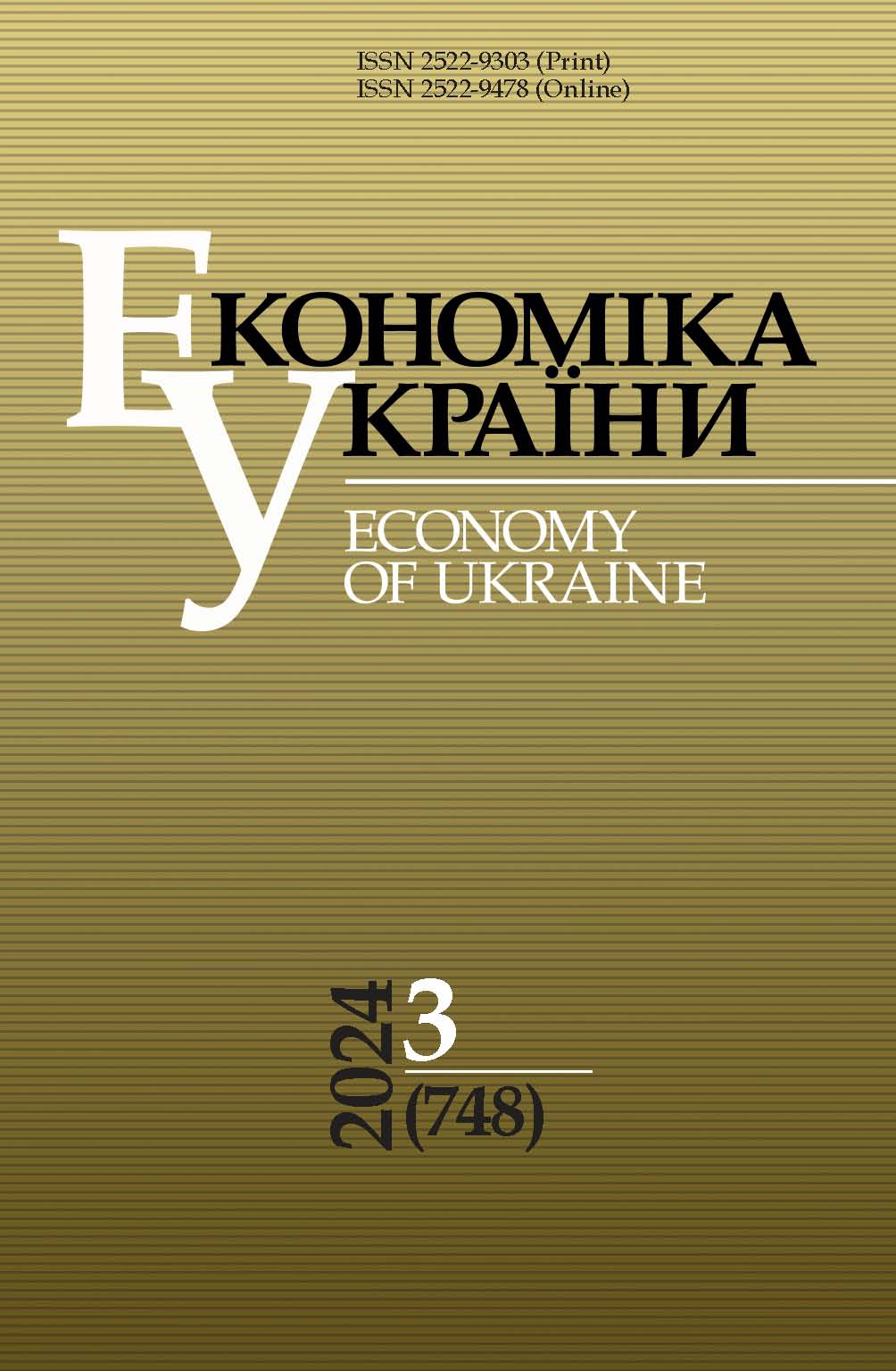РОЛЬ БАНКІВ У ЕКОНОМІЧНОМУ ВІДНОВЛЕННІ ЯПОНІЇ ПІСЛЯ ДРУГОЇ СВІТОВОЇ ВІЙНИ
DOI:
https://doi.org/10.15407/economyukr.2024.03.003Ключові слова:
повоєнна відбудова економіки; банківська система Японії; стратегічні банки; конфуціанські цінності; кейрецу; «план Доджа»; пріоритезація виробництваАнотація
У контексті залучення потенціалу банківського сектору для повоєнної реконструкції економіки України здійснено комплексний аналіз ролі банків у економічному відновленні Японії, визначено ключові фактори, суб’єктів та інституціонально-фінансові інструменти, що забезпечили успіх даного процесу. Передумовами успішної повоєнної відбудови японської економіки були: практично повне відокремлення внутрішньої фінансової системи від міжнародних фінансових структур; сувора довгострокова фіксація обмінного курсу ієни, валютний і фінансовий контроль з боку держави; збалансування державного бюджету; повна відмова уряду від випуску урядових боргових зобов’язань; жорстка функціонально-статусна ієрархія банків та інших кредитно-фінансових установ; заборона комерційним банкам проводити емісію, розміщувати цінні папери нефінансових корпорацій і виконувати трастові операції; запровадження мінімальних ставок за депозитами населення. Усе це забезпечило направлення обмежених фінансових ресурсів афілійованих з урядом стратегічних банків, комерційних банків і ощадних фінансових установ на інвестування пріоритетних, експортоорієнтованих галузей промислового виробництва.
Розкрито роль конфуціанських комунітарно-солідаристських цінностей у забезпеченні успіху стратегічної ставки уряду на свідоме обмеження населенням поточного споживання і направлення заощаджень домогосподарств банківськими каналами на цілі інноваційного економічного зростання. Показано, що основними суб’єктами побудови фінансового механізму післявоєнної Японії були великі корпорації головних галузей промисловості, фінансові установи, через які спрямовувалися грошові потоки, і міністерство фінансів, яке виступало опікуном фінансової ієрархії.
У цьому контексті пропонується заохочувати впровадження в Україні комунітарно-солідаристської ціннісної моделі відбудови й розвитку економіки, притаманної Японії та іншим економічно розвинутим країнам і суспільствам конфуціанської традиції, таким як Південна Корея, Сінгапур і Тайвань.
Посилання
Fukuyama, F. (1995). Trust: The Social Virtues and the Creation of Prosperity. New York, Free Press. 457 p.
Sugihara, K. (2003). The East Asian Path of Economic Development: A Long-Term Perspective. In: The Resurgence of East Asia: 500, 150 and 50 Years Perspectives. Arrighi, G., Hamashita, T., Seldon, M. (Eds.). London, New York, Routledge. 368 p. P. 78-123.
Sakakibara, E., Noguchi, Yu. (1988). Organization for Economic Reconstruction. In: Inside the Japanese System. Readings on Contemporary Society and Political Economy. Okimoto, D., Rohlen, Th. (Eds.). California, Stanford University Press. 286 p. P. 43-54.
Morishima, M. (1988). Confucianism as a Basis for Capitalism. In: Inside the Japanese System. Readings on Contemporary Society and Political Economy. Okimoto, D., Rohlen, Th. (Eds.). California, Stanford University Press. 286 p. P. 36-38.
Ohno, K. (2006). The Economic Development of Japan: The Path Travelled by Japan as a Developing Country. Tokyo, GRIPS Development Forum; National Graduate Institute for Policy Studies. 244 p.
Takahashi, R. (2022). The origins of income equality with a small government in Japan: An analysis of the formation of Japanese-style income policy in 1975. Contemporary Japan, Nov 01. https://doi.org/10.1080/18692729.2022.2137757
Allen, G. (1958). Japan’s economic recovery. London, Oxford University Press. xi, 215 p.
Uchino, T. (1983). Japan’s Postwar Economy: An Insider’s View of Its History and Its Future. Tokyo, New York, San Francisco, Kodansha International Ltd. 286 p.
Hoshi, T., Kashyap, A. (2004). Corporate Financing and Governance in Japan: The Road to the Future. Cambridge, MA, The MIT Press. 378 p.
Ivanov, S. (2019). Economic recovery and development of countries after armed conflicts and wars: Ukraine’s opportunities that have not lost yet. Economy of Ukraine. 62. 1(686). 75-89. https://doi.org/10.15407/economyukr.2019.01.075 [in Ukrainian].
Borodina, O., Lyashenko, V. (2022). Post-War Economic Recovery: World Experience and Attempt to Adapt it for Ukraine. Herald of the Economic Sciences of Ukraine, No. 1(42), pp. 121-134. https://doi.org/10.37405/1729-7206.2022.1(42).121-134 [in Ukrainian].
Bartelme, D., Costinot, А., Donaldson, D., Rodriguez-Clare, А. (2021). The Textbook Case for Industrial Policy: Theory Meets Data. MIT Economics Working Paper. November. 92 р. URL: https://dave-donaldson.com/wp-content/uploads/BCDR.pdf
Clayton, J. (1985). The Years of MacArthur. Vol. III. Triumph and Disaster 1945-1964. Boston, Houghton Mifflin. 864 p.
Addicott, D. (2017). The Rise and Fall of the Zaibatsu: Japan’s Industrial and Economic Modernization. Global Tides. Vol. 11. Article 5. 16 p. URL: https://digitalcommons.pepperdine.edu/globaltides/vol11/iss1/5
Okita, S. (Compiler) (1990). Postwar Reconstruction of the Japanese Economy. Ed. by the Special Survey Committee, Ministry of Foreign Affairs, Japan (September 1946). Tokyo, University of Tokyo Press (reprinted). xxix, 194 p.
Ohno, K. (2017). The History of Japanese Economic Development. London, Routledge. 218 p. https://doi.org/10.4324/9781315444048
Kuznetsov, Yu., Navlitskaya, G., Syritsyn, I. (1988). The history of Japan. M. 431 p. [in Russian].
Druzhynin, N. (2003). Japan: an economic miracle. S-Pt. 272 p. [in Russian].
Liu, Y., Westelius, N. (2016). The Impact of Demographics on Productivity and Inflation in Japan. IMF Working Paper. No. 16/237. 18 p. URL: https://www.imf.org/external/pubs/ft/wp/2016/wp16237.pdf
Westelius, N. (2020). Twenty Years of Unconventional Monetary Policies: Lessons and Way Forward for the Bank of Japan. IMF Working Paper. No. 2020/226. 28 p. https://doi.org/10.5089/9781513560359.001
##submission.downloads##
Опубліковано
Як цитувати
Номер
Розділ
Ліцензія
Авторське право (c) 2024 Видавничий дім "Академперіодика" НАН України

Ця робота ліцензується відповідно до Creative Commons Attribution-NonCommercial-NoDerivatives 4.0 International License.



